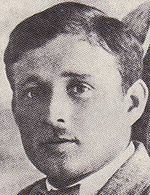
HaMagen
Encyclopedia


Ottoman Empire
The Ottoman EmpireIt was usually referred to as the "Ottoman Empire", the "Turkish Empire", the "Ottoman Caliphate" or more commonly "Turkey" by its contemporaries...
Palestine, founded by Yosef Lishansky
Yosef Lishansky
Yosef Lishansky was a Jewish paramilitary and a spy for the British in Ottoman Palestine. Upon his arrival in Palestine, Lishansky sought to join HaShomer but, denied membership, he founded a rival organization, HaMagen. Several years later, he joined the Jewish espionage organization, Nili...
in summer 1915. It guarded villages in the northern Negev
Negev
The Negev is a desert and semidesert region of southern Israel. The Arabs, including the native Bedouin population of the region, refer to the desert as al-Naqab. The origin of the word Neghebh is from the Hebrew root denoting 'dry'...
and disbanded in summer 1917, following Lishansky's departure to Nili
Nili
Nili of Israel will not lie") was a Jewish espionage network which assisted the United Kingdom in its fight against the Ottoman Empire in Palestine during World War I.-Establishment:...
.
Background and founding
At the time of HaMagen's founding, HaShomerHashomer
Hashomer was a Jewish defense organization in Palestine founded out of Bar-Giora in April 1909. It ceased to operate after the founding of the Haganah in 1920. The purpose of Hashomer was to provide guard services for Jewish settlements in the Yishuv, freeing Jewish communities from dependence...
was the only all-Jewish defense organization in Ottoman Palestine. Due to the high price, and the elitist and idealistic policies of HaShomer, most Jewish towns and villages were guarded by Arabs. An attempt was made in 1912 to create a rival organization, HaNoter, but it lasted only one year.
HaMagen was created in summer 1915, and Yosef Lishansky, who was rejected from HaShomer, became its leader. According to HaMagen's David Tsalevich, some of the organization's members were disgruntled HaShomer would-be inductees, who were not accepted despite extensive trial periods. Ben-Zion Mashevich and David Tsalevich were members of both HaShomer and HaMagen, but denied any connections with the latter.
The organization consisted of about 20 members, including men from Poale Zion
Poale Zion
Poale Zion was a Movement of Marxist Zionist Jewish workers circles founded in various cities of the Russian Empire about the turn of the century after the Bund rejected Zionism in 1901.-Formation and early years:Poale Zion parties and organisations were started across the Jewish diaspora in the...
. The Judea Workers' Union provided further manpower during the organization's early period.
Activities
After negotiations, HaMagen was selected to guard four southern villages: RuhamaRuhama
Ruhama is a kibbutz in the Negev desert in southern Israel. The original settlement established in 1911, is considered the first modern Jewish settlement in the Negev....
, Gedera
Gedera
-External links:** *...
, Be'er Tuvia
Be'er Tuvia
Be'er Tuvia is a moshav in the Southern District of Israel near the city of Kiryat Malakhi. It is affiliated with the Be'er Tuvia Regional Council....
, and Ekron (today Mazkeret Batya
Mazkeret Batya
Mazkeret Batya is a town in the center of Israel located southeast of Rehovot and from Tel-Aviv. Mazkeret Batya spans an area of 7,440 dunams . In December 2008, it had a population of 9,900. The mayor of Mazkeret Batya is Meir Dahan.-History:Mazkeret Batya was established on November 7, 1883 by...
).
Difficulties and decline
Although HaMagen was accused of benefitting from the gold transferred from the British to the NiliNili
Nili of Israel will not lie") was a Jewish espionage network which assisted the United Kingdom in its fight against the Ottoman Empire in Palestine during World War I.-Establishment:...
, the economic situation of most of the guardsmen (except in Ekron) was dire. They usually guarded barefoot and passed around a single pair of shoes when it was required. Food was provided by the local farmers, who took the Magen members in turn for a month each.
HaShomer, the well-established Jewish defense organization at the time, did not attempt to shut down HaMagen when it was founded, because they did not work in the same areas. However, tensions rose when HaShomer failed to take over the guarding of Gedera from HaMagen in 1916. As soon as HaShomer returned to operate in the southern town Rehovot
Rehovot
Rehovot is a city in the Center District of Israel, about south of Tel Aviv. According to the Israel Central Bureau of Statistics , at the end of 2009 the city had a total population of 112,700. Rehovot's official website estimates the population at 114,000.Rehovot was built on the site of Doron,...
, they officially asked the Judea Workers' Union to boycott HaMagen. The request was presided over by Levi Eshkol
Levi Eshkol
' served as the third Prime Minister of Israel from 1963 until his death from a heart attack in 1969. He was the first Israeli Prime Minister to die in office.-Biography:...
and Avraham Herzfeld
Avraham Herzfeld
-Biography:Herzfeld was born in Stavich in the Russian Empire in 1891. He attended a yeshiva and was certified as a rabbi. In 1906 he joined the Socialist Zionists. He was arrested in Vilna in 1910 for revolutionary activities, and was exiled to Siberia...
, and denied on the grounds that HaMagen's own regulations forbade competition with HaShomer.
After Lishansky joined Nili
Nili
Nili of Israel will not lie") was a Jewish espionage network which assisted the United Kingdom in its fight against the Ottoman Empire in Palestine during World War I.-Establishment:...
, he was forced to neglect HaMagen, until finally rumors of his involvement in Nili caused the organization to disband. The Judea Workers' Union's later stance towards the organization contributed to its decline—the union did not boycott HaMagen, but discontinued supporting it with manpower, and following HaShomer's appeals, agreed not to help HaMagen acquire guarding positions in more villages.

